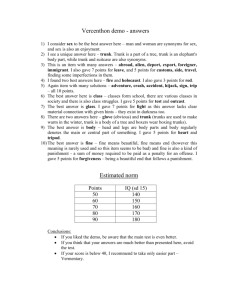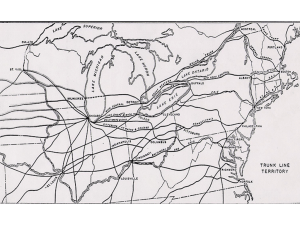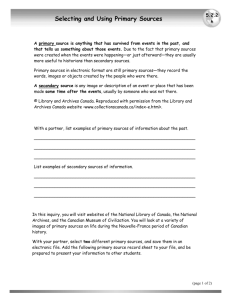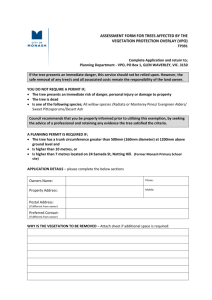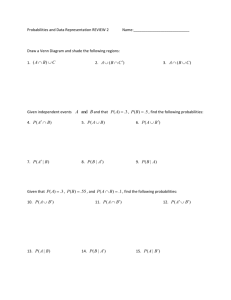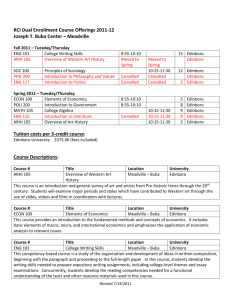Examining Pennsylvania History Through
advertisement
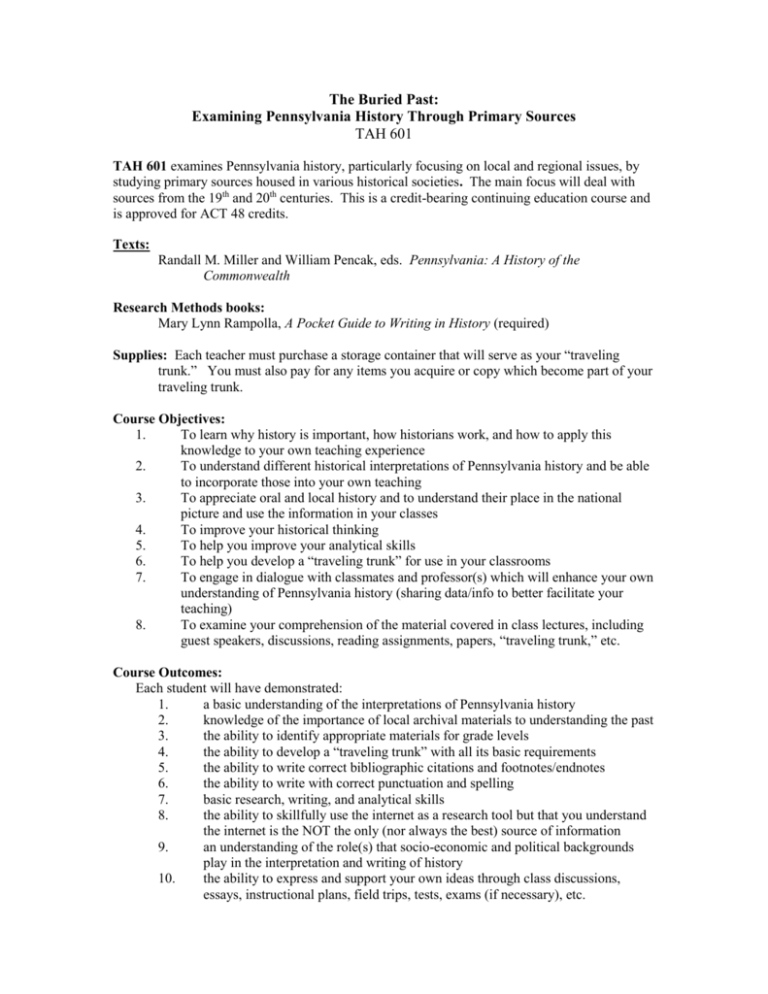
The Buried Past: Examining Pennsylvania History Through Primary Sources TAH 601 TAH 601 examines Pennsylvania history, particularly focusing on local and regional issues, by studying primary sources housed in various historical societies. The main focus will deal with sources from the 19th and 20th centuries. This is a credit-bearing continuing education course and is approved for ACT 48 credits. Texts: Randall M. Miller and William Pencak, eds. Pennsylvania: A History of the Commonwealth Research Methods books: Mary Lynn Rampolla, A Pocket Guide to Writing in History (required) Supplies: Each teacher must purchase a storage container that will serve as your “traveling trunk.” You must also pay for any items you acquire or copy which become part of your traveling trunk. Course Objectives: 1. To learn why history is important, how historians work, and how to apply this knowledge to your own teaching experience 2. To understand different historical interpretations of Pennsylvania history and be able to incorporate those into your own teaching 3. To appreciate oral and local history and to understand their place in the national picture and use the information in your classes 4. To improve your historical thinking 5. To help you improve your analytical skills 6. To help you develop a “traveling trunk” for use in your classrooms 7. To engage in dialogue with classmates and professor(s) which will enhance your own understanding of Pennsylvania history (sharing data/info to better facilitate your teaching) 8. To examine your comprehension of the material covered in class lectures, including guest speakers, discussions, reading assignments, papers, “traveling trunk,” etc. Course Outcomes: Each student will have demonstrated: 1. a basic understanding of the interpretations of Pennsylvania history 2. knowledge of the importance of local archival materials to understanding the past 3. the ability to identify appropriate materials for grade levels 4. the ability to develop a “traveling trunk” with all its basic requirements 5. the ability to write correct bibliographic citations and footnotes/endnotes 6. the ability to write with correct punctuation and spelling 7. basic research, writing, and analytical skills 8. the ability to skillfully use the internet as a research tool but that you understand the internet is the NOT the only (nor always the best) source of information 9. an understanding of the role(s) that socio-economic and political backgrounds play in the interpretation and writing of history 10. the ability to express and support your own ideas through class discussions, essays, instructional plans, field trips, tests, exams (if necessary), etc. Methods of Assessment: 1. 2. Exams. Pre-test and Post-test. Group Research Assignment. Develop a Traveling Trunk appropriate to the grade (s) you teach. You will be divided into research teams of 3-4 people depending on the grade you teach. You will work in teams to develop an appropriate topic(s) to focus on for the course. Each member of the team will contribute to the trunk and its artifacts. This is a team project even though you will each develop your trunk; trunks in any given team should be identical. Groups will be based on the grade level you teach. Periodic reviews of your “traveling trunk” will occur. Items that should be included in the trunk include at a minimum: A. Journals and Diaries B. Letters C. Newspapers D. Documentaries and Film E. Census Records F. Photographs G. Government Documents H. Court Records I. Narratives J. Oral History K. Art and Literature L. Club Records M. Military Records N. Company Records O. Anything else you consider appropriate including 3-dimensional objects (replicas) *Keep in mind that these are items that may be used in your instructional plans. 3. Historical Readings List. Each teacher will develop an extensive reading list for each item included in the trunk. Each reading identified must be described explaining how you will use this in your course(s). Periodic reviews will occur each week. 4. Site Visit Reports. Each teacher will submit a one page (TYPED) summary of after each visit to a museum or historic site. Summaries will answer the following questions: Summarize what you learned Identify what you can use in your classes Explain how you will use what you learned NOTE: It is not satisfactory nor acceptable to say that “I learned nothing.” 5. Final report on Oct. 23. Each group will give a brief presentation on the traveling trunk. 6. Field Trips to various historical societies and museums in northwestern Pennsylvania. Teachers will use information gathered in their traveling trunks. 7. Discussion is expected and required. If no discussion occurs, quizzes will be given to “encourage” you to keep up with your work in this course. 8. Laptops. On selected dates you will be required to bring your laptops to class. Grading Percentages: Pre-test =15% Post-test =15% Research Assignment =30% Final Oral Report =10% Historical Readings =15% Site Visit Reports =15% 100% Grading Scale: 0-59 =F 60-67 =D 68-69 =D+ 70-77 =C 78-79 =C+ 80-87 =B 88-89 =B+ 90-100=A Course Outline: Date Day Topic Reading Assignment 8/28 T Introduction: Using Local History Who Owns Local History? Understanding the Past Class Time 6-8:30 Technology Training (8:00-8:30) Pretest for TAH 601 and Institutes 8/30 R Transforming 19th Century Pennsylvania Politics, Economics, and Culture Race, Gender, Ethnicity Immigration and Unionization 9/4 T The Goodell Gardens and Homestead (Mr. Dana Atwood) 6-8:30 Edinboro Area Historical Society (Ms Nancy Harned) Edinboro University Archives (Prof. David Obringer) Edinboro University Oral History Studio (Dr. Joseph Laythe) Teachers will be be divided into 4 groups and rotate from various sites, spending 20 minutes at each site for a brief orientation 6-8:30 Sept. 4 Site Visit Rotation: Teachers will sign up for Teams 1, 2, 3, or 4 on Aug. 28. 6:00 p.m. Team 1 will begin at Goodell Gardens/Homestead Team 2 will begin at the Edinboro Area Historical Society Team 3 will begin at the Oral History Studio (HH116) Team 4 will begin at the EUP Archives in the Library. 6:25 p.m. Teams must leave first site by 6:25 Team 1 and Team 2 will switch after 25 minutes at each site Team 3 and Team 4 will switch after 25 minutes at each 6:35 p.m. Team 1 at Edinboro Area Historical Society Team 2 at Goodell Team 3 at University Archives Team 4 at Oral History Studio 7:00 p.m. Teams 1-2 will travel to campus; Teams 3-4 will travel to off-campus sites 7:10 p.m. Team 1 at University Archives in the Library Team 2 at Oral History Studio in HH116 Team 3 at Goodell Gardens/Homestead Team 4 at Edinboro Area Historical Society 7:40 p.m. Team 1-2 will switch Team 3-4 will switch 7:50 p.m. Team 1 at Oral History Studio Team 2 at University Archives Team 3 at Edinboro Area Historical Society Team 4 at Oral History Studio 9/9 Su “Sailing on the Brig Niagara: The Role of the Brig in the War of 1812” Guest lecturer: Capt. Walter Rybka 9-4 9/11 T Working Sessions 6-8:30 BRING LAPTOPS TO CLASS SUMMARIES DUE (Goodell, EAHS, Archives, OHS, and Brig) 9/18 T Drakes Well (meet at Drakes Well Museum) 5-9 9/22 Sa Examining PA History: The Heinz History Center (trip departs at 7:00 a.m. and returns after dinner) 10-5 9/25 T Examining/Evaluating Local Sources 6-8:30 BRING LAPTOPS TO CLASS SUMMARIES DUE (Drakes Well and Heinz) 10/2 T Erie County Historical Society and Museums/Archives Archivist Annita Andrick 5-9 10/4 R Erie County Historical Society and Museums/Archives Archivist Annita Andrick 5-9 10/9 T Examining/Evaluating Local/Regional Sources 6-8:00 BRING LAPTOPS TO CLASS SUMMARY DUE (ECHS) 10/16 T Pennsylvania and War 6-8:00 BRING LAPTOPS TO CLASS 10/23 T Synthesis: Evaluating Primary Sources for the Classroom 6-9:00 Group Reports Post-test All Final projects due Note: When working at the various archives and historical societies, you should look for the following types of Local, Regional and State sources: Your main task is to identify, evaluate, and determine which materials are appropriate for your classes. I. J. K. L. M. N. O. P. I. J. K. L. M. N. Journals and Diaries Letters Newspapers Documentaries and Film Census Records Photographs Government Documents Court Records Narratives Oral History Art and Literature Club Records Military Records Company Records “I reserve the right to make any changes I deem necessary in this course.” Dr. Jerra Jenrette

